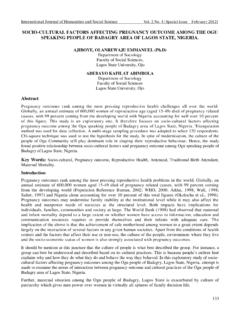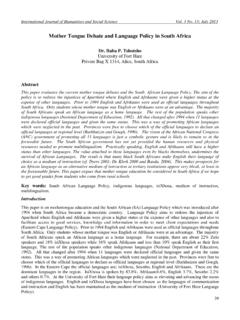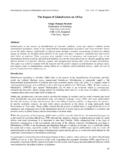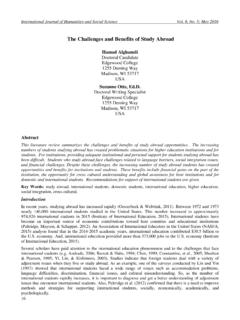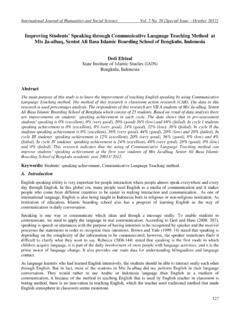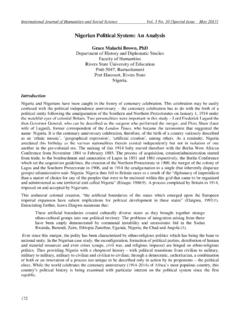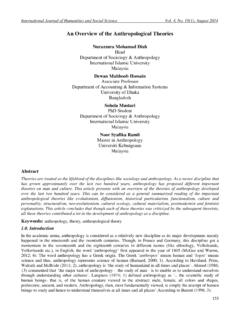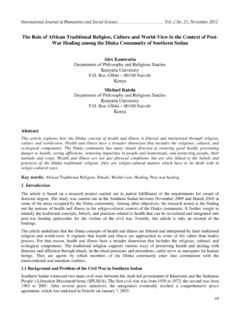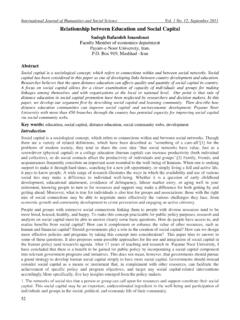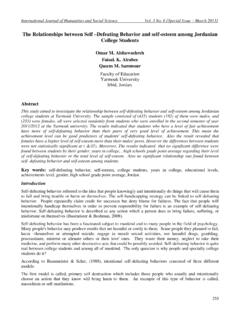Transcription of Security and National Development in Nigeria: The …
1 International Journal of Humanities and Social Science Vol. 3 No. 4 [Special Issue February 2013] 285 Security and National Development in nigeria : The Threat of Boko Haram C. Jaja Nwanegbo PhD Department of Political Science Federal University Wukari, nigeria Jude Odigbo Department of Political Science Federal University Wukari, nigeria Abstract One of the major setbacks to Development in nigeria is insecurity. Until very recently, plethora of explanations on the crawling pace of Development in nigeria tends to pay infinitesimal attention to the centrality of Security to National Development . It is no surprise therefore that since 1999 when nigeria returned to civil rule insecurity tends to have hampered National Development . Security is evidently the pillar upon which every meaningful Development could be achieved and sustained.
2 The Development strides in most Western Capitalist States that place premium on Security lend credence to this assertion. Whilst nigeria is endowed with abundant resources, negligence to numerous challenges of insecurity of the environment appears to have created porous Security condition that engendered violence and retards Development . This paper relies on sequential technique of qualitative analysis as it looks at the imminent Security danger posed by Boko Haram in the light of the present onslaught and the extent the insurgence has shape Development trajectories in nigeria . It is the opinion of the paper that Security avails the opportunity for Development . The paper thus, concludes that nigeria can achieve sustainable Development only through firm prioritization of Security in the Development agenda. Key Words: Security , National Development , nigeria , Boko Haram.
3 Introduction In May 1999 nigeria s return to civil rule was accompanied with fresh hopes and latent optimism. This optimism is predicated on the fact that democracy would guarantee freedom, liberty, and equity and enhances Security of lives and property, which would indeed repositions Development trajectories to sustainability. Regrettably this optimism seems to be a mirage. nigeria is presently rated as one of the poorest Nations in the world with debilitating youths unemployment. For instance, Aganga (2009) observed that over ten million Nigerians were unemployed by March 2009 and unemployment is running at around percent on average (see National Bureau of Statistics Report 2009). This figure geometrically increases yearly with less realistic efforts by the managers of the state to abate the rampaging unemployment problem.
4 In nigeria , like many other developing countries, about 70% of the population live in poverty (Otto and Ukpere 2012: 6767). Majority of the population seem to lack access to pipe borne water, health care facilities, electricity and affordable quality education. Amidst these Development challenges, the Security situation in the country deteriorated drastically. nigeria s return to democratic rule is threatened by Security disaster. Arguably, considerable progress has been achieved in the areas of freedom of speech and liberty, but series of resource based conflict (Niger Delta), ethno-religious crisis (Jos crisis), and communal conflicts persisted. The climax of these Security threats is the insurgence of a group called Boko Haram in the Northern nigeria . Thus, a considerable effort to end the violence and build a sustainable peace to steer the economy to sustainability seems far from realization.
5 The basic questions are: why Development has continued to elude nigeria in spite of numerous amounts of human and material resources? To what extent has Security crisis impacted or contributed to Development crisis in nigeria ? Is Boko Haram really a threat to Development in nigeria ? These pertinent but complex questions needed urgent attention especially now nigeria is struggling to be among twentieth world developed countries in 202020. The Special Issue on Contemporary Issues in Social Science Centre for Promoting Ideas, USA 286 It is against this backdrop that this study addresses the interface between Security and Development in nigeria . Particularly, it seeks to demonstrate that insecurity is a major impediment to Development in nigeria with a particular reference to Boko Haram s activities. The paper is therefore divided into five parts: first is the introductory section, the second is the conceptual explanations, followed by the dimensions of Security in nigeria , the fourth seeks to explain whether Boko Haram is actually a threat to nigeria and the last is conclusion and recommendations.
6 Security and Development : Conceptual Explanations The concept of Security is not alien and has been central even in the primitive societies. The need for Security necessitated the social contract in which people willingly surrendered their rights to an organ (government) who oversees the survival of all. For decades, issues relating to Security tend to occupy the centre stage in the Development discourse. With the end of the cold war, there have being attempts to shift conceptualization of Security from a state-centric perspective to a broader view that places premium on individuals, in which human Security that embodies elements of National Security , human rights and National Development remain major barometer for explaining the concept. At the heart of this debate there have been attempts to deepen and widen the concept of Security from the level of the states to societies and individuals, and from military to non-military issues (Krahmann, 2003:9).
7 Majorly, two contending perspectives tend to provide the basis for the conceptualization of human Security . One is a neo-realist theoretical framework, which is predicated on the primacy and centrality of state in conceptualizing Security . It tends to explain Security from the standpoint of state primary responsibility. Within this context, Buzan (1991) argued that the straitjacket militaristic approach to Security that dominated the discourse during the Cold War was simple-minded and subsequently led to the underdevelopment of the concept. For him, human Security includes political, economic, social and environmental threats including those that are militaristic. Thus, Buzan (1991) illustrated a tripartite concept analysis of Security based on international system, state level and individual level but submitted that sovereign states should remain the most effective Security provider.
8 The second approach is a postmodernist or pluralist view that seeks to displace the state as a major provider of Security but rather places greater emphasis on non-state actors. Advocates of this approach tend to argue that the concept of Security goes beyond a military determination of threats. According to Booth (1994) states and implicitly governments must no longer be the primary referents of Security because governments which are supposed to be the guardians of their peoples Security have instead become the primary source of insecurity for the many people who live under their sovereignty. As a result, Booth (1994) further argued that human Security is ultimately more important than state Security . While concurring with Both, Nwabueze (1989:2) posited that economic Security of the individual is or should be of far greater concern to the government and society than the Security of the state.
9 Thus, some scholars seem to place emphasis on absence of threat to acquire values or tendencies that would undermine National cohesion and peace as criteria for determining what Security connotes (David 2006; Wolfrs 1962; Oche 2001). In his view, David (2006) posited that Security is the condition or feeling of safety from harm or danger, the defence, protection and the absence of threats to acquire values (cited in Igbuzor, 2011:2). Security in an objective sense, measures the absence of threats to acquire values, in subjective sense, the absence of fear that such values will be attacked (Wolfrs, 1962). In spite of its conceptual complexities, the understanding of the term shows that Security is vital for National cohesion, peace and sustainable Development . Thus: Security has to do with freedom from danger or with threats to a nation s ability to protect and develop itself, promote its cherished values and legitimate interests and enhance the well being of its people.
10 Thus, internal Security could be seen as the freedom from or the absence of those tendencies which could undermine internal cohesion and the cooperate existence of the nation and its ability to maintain its vital institutions for the promotion of its core values and socio-political and economic objectives, as well as meet the legitimate aspirations of the people. Internal Security also implies freedom from danger to life and prosperity (Imobighe cited in Oche 2001:76-77). It therefore refers to the search to avoid, prevent, reduce, or resolve violent conflict- whether the threat originates from other states, non-state actors, or structural socio-economic conditions (Stan, 2004:2). International Journal of Humanities and Social Science Vol. 3 No. 4 [Special Issue February 2013] 287 It is apparent from the foregoing that National Security is a desideratum, sine qua non for economic growth and Development of any country (Oladeji and Folorunso 2007:42).
